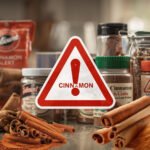A common spice found in kitchens across America, cinnamon, is once again under the spotlight for potential health risks. The Food and Drug Administration (FDA) has expanded its warning, identifying additional brands of ground cinnamon that contain dangerously high levels of lead. This brings the total number of affected labels to sixteen, raising serious concerns for consumers.
The Growing List of Contaminated Spices
Just this past week, four new brands were added to the FDA’s list: HAETAE, Roshni, Durra, and Wise Wife. These join an already concerning group of cinnamon products. The agency has expressed grave concerns, stating, “Based on the FDA’s assessment, prolonged exposure to these products may be unsafe and could contribute to elevated levels of lead in the blood.”
The FDA has urged all companies involved, with the exception of HAETAE, to voluntarily recall their products from store shelves. As of today, ten of the sixteen identified brands have complied with these recall requests.
If you have any of the following ground cinnamon brands in your pantry, the FDA strongly advises you to dispose of them immediately:
- Roshni (2.268 ppm)
- HAETAE (4.60 ppm)
- Durra (2.44 ppm)
- Wise Wife (2.49 ppm)
- Jiva Organics (2.29 ppm)
- Super Brand (7.68 and 6.60 ppm)
- Asli (2.32 ppm)
- El Chilar (3.75 and 7.01 ppm)
- Marcum (2.22 and 2.14 ppm)
- SWAD (2.89 ppm)
- Supreme Tradition (2.37 ppm)
- Compania Indillor Orientale (2.23 ppm)
- ALB Flavor (3.93 ppm)
- Shahzada (2.03 ppm)
- Spice Class (2.04 ppm)
- La Frontera (2.66 ppm)
The lead levels in these products range from 2.03 parts per million (ppm) to a staggering 7.68 ppm, well above what is considered safe.
Why is Lead in Our Cinnamon?
This isn’t the first time lead has contaminated cinnamon. Brian Ronholm, director of food policy at Consumer Reports, sheds light on how this can happen. “Cinnamon comes from the inner bark of several tree species and can absorb lead from the soil in which it’s grown, and the soil can be contaminated with lead from industrial byproducts,” he explained. He also noted that contamination can occur during processing, from equipment, storage containers, or packaging.
The FDA plays a crucial role in monitoring and regulating lead levels in food to safeguard public health. This latest action follows a major investigation in 2023 when tainted cinnamon in applesauce pouches led to hundreds of children suffering from lead poisoning. Brands like WanaBana, Weis, and Schnucks were involved in those widespread recalls. In a separate effort, the FDA issued multiple alerts last year regarding elevated lead in ground cinnamon, with a third alert launched in August 2024 that continues to be updated.
“It’s certainly troubling that these elevated lead levels continue to surface in cinnamon,” Ronholm commented. “However, it’s also reassuring to see the FDA maintaining its scrutiny of these products, especially given the budget and staffing challenges they’ve faced.” The agency had announced plans for significant employee cuts in March, though some have since been reversed. Thousands of FDA-regulated products, from food to drugs and cosmetics, are recalled annually to protect consumers.
The Silent Danger of Lead Exposure
The human body has no known safe level of lead exposure. The FDA emphasizes that even prolonged exposure to elevated lead levels, especially for months or longer, can have severe and lasting health consequences. Young children are particularly vulnerable.
“High levels of exposure to lead in utero, infancy, and early childhood can lead to neurological effects such as learning disabilities, behavior difficulties, and lowered IQ,” the FDA’s latest alert warns.
For adults, the World Health Organization (WHO) highlights that lead can contribute to serious long-term health problems, including an increased risk of high blood pressure, cardiovascular issues, and kidney damage.
Consumers are encouraged to stay informed and check their spice racks. If you believe you may have consumed a product on the recall list and are experiencing health concerns, please consult a medical professional.









